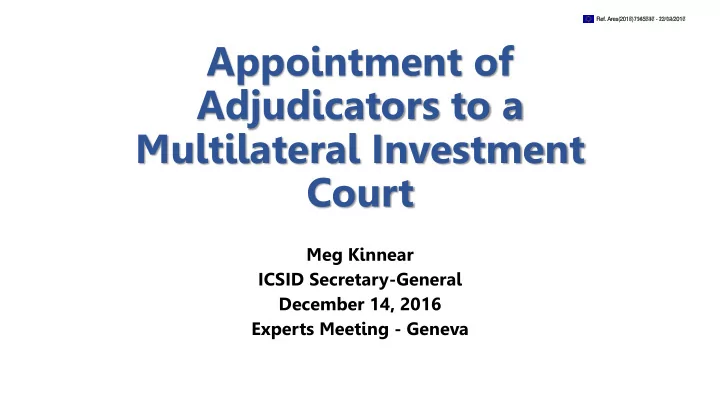

Ref. Ares(2016)7145736 - 22/12/2016 Ref. Ares(2017)1963547 - 13/04/2017 Appointment of Adjudicators to a Multilateral Investment Court Meg Kinnear ICSID Secretary-General December 14, 2016 Experts Meeting - Geneva
Vital to Success of the Court • Nomination and selection process implements the qualifications established for adjudicators • Personal Qualifications: high moral character; independence & impartiality • Experience Qualifications: legal experience (academic, judge, counsel); other professional experience • Knowledge Qualifications: related to specialized mandate of court: public international law, international investment law, case management skills, language requirements 2
Basic Questions • Number – How many adjudicators? • Nomination & Selection – How are they named? • Duration – How long do they serve on the Court? • Case assignment – How are they named to individual cases? 3
…No “Magic” Number • Same number of judges as Contracting Parties • ECtHR: 47 judges • ECJ: 28 judges • Smaller number of judges than Contracting Parties • ITLOS: 21 judges • ICJ: 15 judges • Iran-US Tribunal: 9 arbitrators • WTO AB: 7 members 4
Number – Criteria to Consider • Expected workload • Number of cases; timeline; divisions; tasks; and support • Flexibility • Absences; language; conflict; nationality; administrative tasks; Full-time vs Part-time • Cost • Representativeness 5
Number – Representativeness • Equitable geographic distribution • Principle legal systems of the world • Gender distribution 6
Indicia from the Current System • Caseload: around 70 new cases per year, with 75% based on IIAs (52 cases) • Rate of settlement or discontinuance before award: 34% • Average length of case: 3 years • Usual tribunal size: 3 persons • Arbitrator time spent per case: average of 53 days a year per case • Rate of applications for review: about 41% for ICSID annulment and 68% for WTO AB 7
Factors Affecting Number of Adjudicators Needed • Number of cases initiated per year • Size of divisions (1, 3, 5…) • Mandatory time frames for completion of cases • Rate of settlement • Scope of review mechanism (grounds and standard of review) • Extent of Secretariat support • Administrative duties of adjudicators 8
How Are They Chosen? Nomination • Usually a 2 step process: (1) nomination, then (2) selection • Nomination Methods: • By Contracting States: directly (ITLOS) • By other groups: “National Groups” (ICJ) • By an independent body: Regional Judicial and Legal Services Commission (RJLSC) (Caribbean Court of Justice) or screening process by an independent body (Art. 225 TFEU Panel) 9
How Are They Chosen? Selection • Selection Methods: • By Contracting States: vote (ITLOS) , common accord (CJEU), or by consensus (WTO AB) • By a separate organ: UN General Assembly and Security Council for the ICJ • By an independent body: Regional Judicial and Legal Services Commission (RJLSC) of Caribbean Court of Justice 10
Duration – How Long Do They Serve? • Length of tenure – no magic number • ECtHR: 9 years non renewable • ICJ: 9 years renewable once • ECJ: 6 years renewable once • Iran-US Tribunal: indefinite • WTO AB: 4 years renewable once • Rotation process • Renewability 11
Case Assignment • Usually, the Rules of the Court or its working procedures provide how to allocate specific adjudicators to a specific case • Decision of the Court (ICJ) • Distribution by lot – Drawing list (Iran-US Tribunal, CJEU, ECtHR) • Rotation (WTO AB) 12
Conclusions • No uniform number in international courts • Traditionally, States are primarily/exclusively involved in the nomination and selection procedures • Recent trend to independent body for candidate screening • Terms generally between 4 to 9 years; rotation and re-election must be factored in • Important to decide whether smaller divisions will hear cases/certain stages and if so, how these are determined 13
Recommend
More recommend